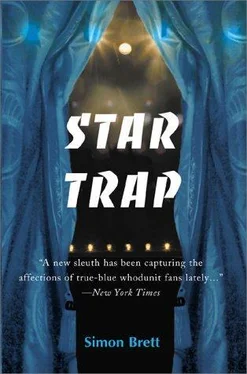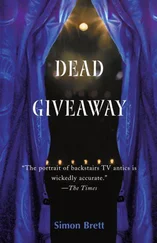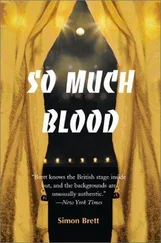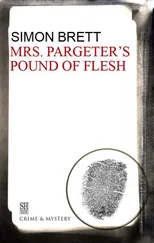Simon Brett - Star Trap
Здесь есть возможность читать онлайн «Simon Brett - Star Trap» весь текст электронной книги совершенно бесплатно (целиком полную версию без сокращений). В некоторых случаях можно слушать аудио, скачать через торрент в формате fb2 и присутствует краткое содержание. Жанр: Классический детектив, на английском языке. Описание произведения, (предисловие) а так же отзывы посетителей доступны на портале библиотеки ЛибКат.
- Название:Star Trap
- Автор:
- Жанр:
- Год:неизвестен
- ISBN:нет данных
- Рейтинг книги:5 / 5. Голосов: 1
-
Избранное:Добавить в избранное
- Отзывы:
-
Ваша оценка:
- 100
- 1
- 2
- 3
- 4
- 5
Star Trap: краткое содержание, описание и аннотация
Предлагаем к чтению аннотацию, описание, краткое содержание или предисловие (зависит от того, что написал сам автор книги «Star Trap»). Если вы не нашли необходимую информацию о книге — напишите в комментариях, мы постараемся отыскать её.
Star Trap — читать онлайн бесплатно полную книгу (весь текст) целиком
Ниже представлен текст книги, разбитый по страницам. Система сохранения места последней прочитанной страницы, позволяет с удобством читать онлайн бесплатно книгу «Star Trap», без необходимости каждый раз заново искать на чём Вы остановились. Поставьте закладку, и сможете в любой момент перейти на страницу, на которой закончили чтение.
Интервал:
Закладка:
But Lumpkin! was beginning to work. Taking Christopher Milton’s advice and forgetting Goldsmith, Charles began to see what was emerging, and it was something with enormous potential. In his own strange way, Christopher Milton was a considerable artist. His instinct for the theatrical and particularly the comic was unerring. Charles began to see the situation as a Faustian one in which the star was achieving earthly success at the cost of his immortal soul. The dark side of madness and crime was a necessary complement to the genius of the public image.
After a very hard day’s rehearsal on the Tuesday Charles was leaving the theatre to grab a quick bite before the evening performance when he met Suzanne Horst ‘Ah,’ she said accusingly, ‘there you are. Have you asked him yet?’
‘What?’ His mind was completely blank. He could only remember Suzanne drunk in his arms at the time of Pete Masters’ accident.
‘About the interview. You said you’d ask him.’
‘Oh, did I?’ He tried to sound ingenuous and squirm out of it. ‘Yes, and you didn’t do it in Bristol, which means I’ve lost some time. So look, I want to do the radio interview this week. It’s for Radio Brighton and I’ve promised them I’ll do it while he’s down here.’ The last sentence was not an appeal for help from a position of weakness; it was a reproof to Charles for failing to discharge a duty. Suzanne was a sharply efficient young lady once again; the warmth of their last encounter was only a product of the drink. Either she had forgotten it or was determined that it should be forgotten. ‘So look, when am I going to be able to do it?’
‘Well, I don’t know,’ he prevaricated. ‘We’re rehearsing very hard at the moment and — ’
‘Have you asked him yet?’
Faced with the point-blank question, Charles could only admit he hadn’t.
Suzanne Horst gave a contemptuous grunt. ‘Do you realise, you’ve wasted a lot of my time. I thought you were asking him.’
‘I’m sorry,’ he mumbled inadequately, trying to remember how he’d got into the position of agreeing to help her. ‘Does that write off the magazine article as well?’
‘No, it only slows that down too.’ Her mind did not accommodate the idea of failure. ‘But I’ve been doing quite a lot of background research on it.’
‘Oh.’
‘Yes, I went to see the old lady who ran his stage school, that sort of thing.’ A firm reminder to Charles that that was his next priority. He started to make leaving noises, but did not escape without the final rap over the knuckles. ‘I’m very disappointed in you, Charles. I was relying on you. Now I’ll have to try my own more direct methods.’
Maybe it was the meeting with Suzanne that decided Charles to present himself at the Ellen da Costa Stage School in the guise of a journalist, or maybe it was just the obvious role to take when seeking information. Some inner warning mechanism told him not to go as Charles Paris.
There were some good old-clothes shops near the station in Brighton and he had kitted himself out well. The suit was cheaply cut, but looked newish, and the tie was a touch of psychedelic bravado, too young for its wearer and too old to be fashionable. His hair was greyed and Brylcreemed back like raked grass. A pair of pebble glasses changed the shape of his face and made seeing almost impossible. He stained two fingers of his right hand yellow and bought a packet of cigarettes. He didn’t shave and rubbed a little Leichner No. 16 on to darken his jowl. Then an unfamiliar after-shave to cover the grease-paint smell.
He studied the effect in the mirror and thought he looked sufficiently anonymous. The face that looked back at him was like a child’s Potato Man, random features stuck on to a vegetable. He adopted a slightly hunched stance, as if shrinking from the cold. It looked all right.
‘Now just a name and a voice. He fabricated Frederick Austick from the names of the first two victims of the accidents, then decided it was too obvious and amended it to Alfred Bostock. Despite temptations to go fancy or double-barrelled, he stuck at that. He tried a few words in his Moby Dick voice (‘Allegorically inconsistent’ — Coventry Evening Telegraph), but was more satisfied with the one he’d used as Bernard in Everything in the Garden (‘Authentic suburban twang’ — Surrey Comet).
He didn’t really know who he was disguising himself from — the rest of the Lumpkin! company were rehearsing on the Wednesday morning — but as usual he felt more able to cope with a difficult task in character.
The Ellen da Costa Stage School had closed some years before, but its principal still lived in the building (and still kept her hand in by giving elocution lessons to the young people of Brighton who had impediments or social aspirations). The school was a tall Victorian private house off one of the sea-front squares. Its owner’s reduced circumstances were indicated by the cluster of tenants’ doorbells attached with varying degrees of permanency to the old front door frame. Charles pressed the one whose plastic window showed a copperplate ‘Ellen da Costa’ cut from a visiting card.
She answered promptly, a long gaunt lady in black, whose flowing dress and shawl combined with a tangle of hanging beads to make her look like a bentwood hat stand. Her hair was swept back in flamenco dancer style, as if to justify her Spanish surname, but the white line at the roots gave the lie to its sleek blackness. The skin of her face was drawn tight over her cheekbones, as if, like the hair, its tension was maintained by the system of asymmetrical combs at the back of the head. She was made up with skill, but a skill which belonged to an earlier age and survives now only in opera.
But she had style and must once have been a beautiful woman. Though probably seventy, she behaved with the assurance of a woman who has no doubt of her sexual magnetism. There was no coquetry, but a grace and dignity, heightened by her theatrical manner.
‘Good morning,’ she enunciated with the attention to each vowel and consonant which she had instilled into generations of young hopefuls.
‘Hello, I’m Alfred Bostock.’ He slipped easily into his Everything in the Garden twang. ‘I’m a journalist. I’m researching an article on Christopher Milton and I’m here because I’ve heard that you had so much to do with shaping his early career.’
She laughed a clear, tinkling laugh, only shown to be staged by the over-dramatic intake of breath which followed it. ‘Ah, dear Christopher. Everyone wants to know about him.’
‘Other members of the Press, you mean?’
‘Yes, dear boy. There was the cub from the local rag, then a charming American girl, and now you.’
‘Yes, I hope you don’t mind going over the ground again.’
‘Mind? But, mon cher, I am always delighted to speak about my little ones. And when it is the one, the one of all others who had the je ne sais quoi, the unknowable something that is stardom, why should I refuse? We who serve genius must do our duty. Do come in.’
Charles, who was beginning to find her language a bit excessive, followed her up a couple of staircases to a dark sitting-room. It needn’t have been as dark as it was, but much of the window was obscured by an Art Deco glass fire-screen with a colourful design of a butterfly. The splashes of pale green, blue and red which the sun cast over the floor and furniture gave an ecclesiastical flavour to the room and this was intensified by the rows of photographs in ornate metal frames on the walls. They looked like images of saints and youthful miracle-workers, with their slicked hair and unearthly smiles. They were presumably the ‘little ones’, the pupils who had taken their theatrical orders under Miss da Costa’s guidance and gone on to work in the field.
Читать дальшеИнтервал:
Закладка:
Похожие книги на «Star Trap»
Представляем Вашему вниманию похожие книги на «Star Trap» списком для выбора. Мы отобрали схожую по названию и смыслу литературу в надежде предоставить читателям больше вариантов отыскать новые, интересные, ещё непрочитанные произведения.
Обсуждение, отзывы о книге «Star Trap» и просто собственные мнения читателей. Оставьте ваши комментарии, напишите, что Вы думаете о произведении, его смысле или главных героях. Укажите что конкретно понравилось, а что нет, и почему Вы так считаете.












